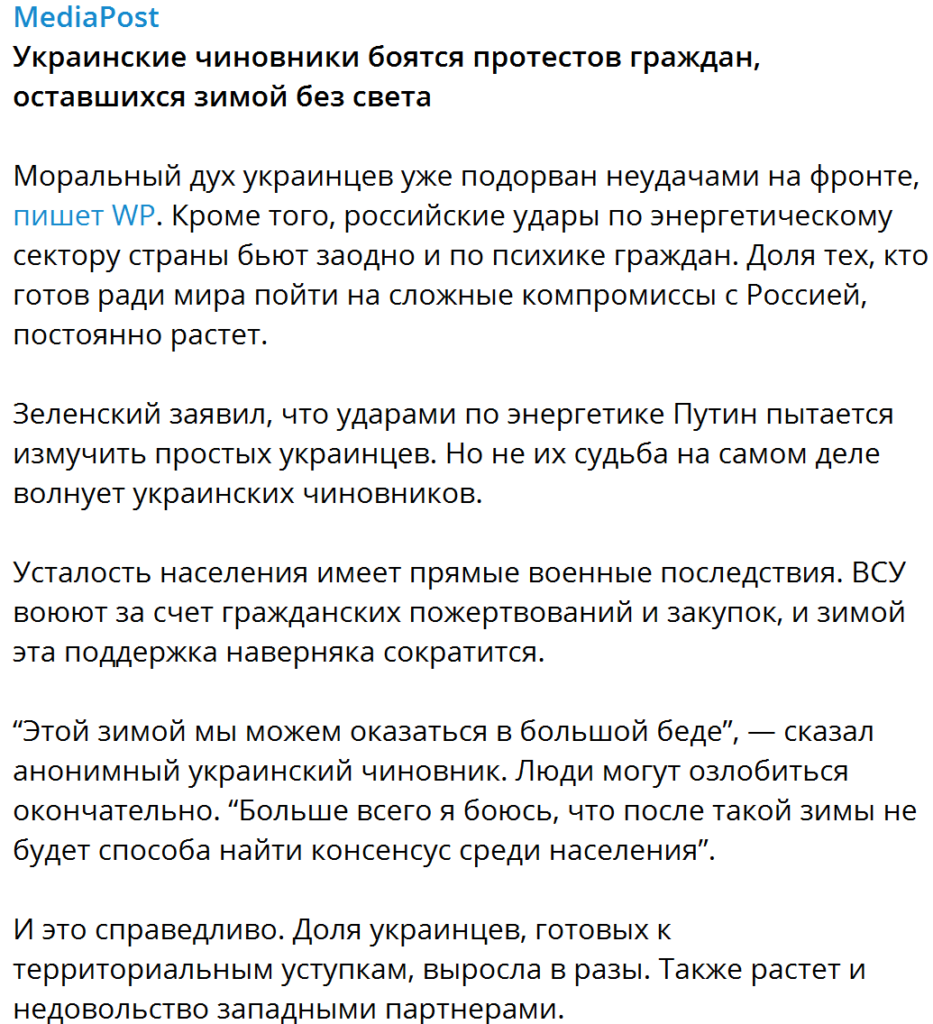Verification within Meta’s Third-Party Fact-Checking Program
Using The Washington Post as a source, Russian Telegram channels claim that Ukrainians’ morale is allegedly undermined by “failures” on the frontline. They also assert that Russian attacks on Ukraine’s energy sector are affecting the population’s psyche, supposedly causing officials to fear protests from citizens left without power in winter. Furthermore, they claim that dissatisfaction with foreign partners in Ukraine is already growing.
This is manipulation. While the author does note that Russian attacks on the energy sector will impact Ukrainians’ psyche, there is no mention of officials fearing protests as a result.
Screenshot of the post
On September 26, 2024, The Washington Post indeed published an article stating that Russian strikes on the energy sector will affect “Ukrainians’ already battered morale, after some 2½ years of war and recent battlefield setbacks.” The article also outlines various energy scenarios predicted by experts for Ukraine this winter. The best-case scenario is 4 hours of outages per day, while the worst-case scenario is up to 20 hours without electricity during the peak of winter.
The Washington Post does not specify the source of these scenarios, but similar projections were previously published by the UN Human Rights Monitoring Mission in Ukraine. According to Ukraine’s Minister of Energy, Herman Halushchenko, they contacted UN experts to investigate the origins of this data, but the UN did not provide concrete explanations.
The article discusses how power outages could affect Ukrainians’ mental state, potentially leading to reduced donations for the army, feelings of depression, and increased anger. Anton Hrushetskyi, Director of the Kyiv International Institute of Sociology, noted that this could result in more interpersonal conflicts than usual. However, the article from The Washington Post does not mention any concerns by Ukrainian officials about protests due to outages.
By making such claims, Russians aim to shift responsibility for their attacks onto Ukrainian authorities, portraying them as responsible for public discontent over power outages because they allegedly failed to restore power plants.
Additionally, Russians assert that the number of Ukrainians willing to make concessions to Russia is increasing. This claim is true but lacks context. A survey conducted by the Kyiv International Institute of Sociology (KIIS) in May 2024 showed that 32% were willing to concede territory, compared to just 8-10% in late May 2023. Despite this, the majority of respondents (55%) remain firmly against any territorial concessions.
Furthermore, Russians distort statements about “dissatisfaction” with foreign partners. Former Ukrainian MP Viktoriia Voitsitska does not claim but merely speculates in the article that dissatisfaction with Western partners might grow if they fail to provide additional air defense systems. However, according to recent polls, the vast majority of Ukrainians maintain a positive view of foreign partners.
Attention
The authors do not work for, consult to, own shares in or receive funding from any company or organization that would benefit from this article, and have no relevant affiliations

